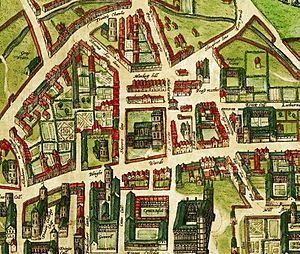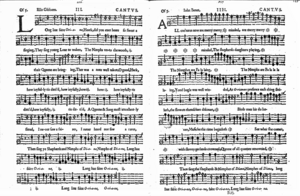Ellis Gibbons facts for kids
Ellis Gibbons (born around 1573 – died around May 1603) was an English composer from the late Renaissance period. He was part of a group known as the English Madrigal School.
Ellis was born in Cambridge into a musical family. His father, William Gibbons, was a town musician called a "wait." Ellis was the second son in the family to survive childhood. By 1598, he was living in Cambridge. He owned properties in both Cambridge and London. This suggests he might have spent a lot of time in London, possibly working as a musician.
When he was 28, Ellis Gibbons became one of only two composers to have two pieces included in The Triumphs of Oriana. This was a famous collection of 25 madrigals published in 1601. His two madrigals were Long live faire Oriana and Round about her Charret. Experts today usually prefer the second one.
No other music by Ellis Gibbons has survived. Some scholars even wonder if he truly wrote these two madrigals, suggesting his brothers might have. Ellis's life was cut short when he died young in May 1603, just two months after his mother passed away. He left behind his brothers Edward, Ferdinando, and Orlando. Orlando would become the most famous musician in the family. Orlando's son, Christopher, also became a well-known composer.
Early Life and Family
Ellis Gibbons was born in Cambridge. He was baptised on November 30, 1573, at Holy Trinity Church, Cambridge. Babies were often baptised very soon after birth back then. So, he was likely born just before that date.
Ellis was the second son in a family full of musicians. His father, William (c. 1540 – 1595), was the leader of the Cambridge "waits." These were town musicians who played for public events. Ellis's older brother, Edward, also became a musician. His younger brother, Ferdinando, was born in Cambridge around 1581 or 1582. Ferdinando later took over their father's role as a wait.
The most famous musician from the family was Orlando. He was born in 1583 in Oxford. However, Edward and Ellis were still living in Cambridge at that time.
Ellis Gibbons owned property in Cambridge. He also owned property near Old St Paul's Cathedral in London. This suggests he spent time in London. Some old stories claimed he was an organist at Salisbury Cathedral or Bristol Cathedral. However, modern experts do not believe this. Records show other people were organists there during that time. We don't have official records of what job Ellis Gibbons had. But it was probably related to music.
His Music and Legacy
Ellis Gibbons is mainly known for his two madrigals in The Triumphs of Oriana. This collection was published in 1601. He was the only composer, besides the editor Thomas Morley, to contribute two madrigals. This is quite unusual because other famous English composers like William Byrd were not included.
Some music experts, like Joseph Kerman, have wondered if one of the madrigals might actually be by Ellis's older brother, Edward. Kerman even called Ellis Gibbons a "non-entity," meaning someone not very important. Another expert, Edmund Fellowes, thought both madrigals might be by the young Orlando Gibbons. However, there is no strong proof for this idea.
The two pieces Ellis Gibbons contributed were Long live fair Orianae (for five voices) and Round about her Charret (for six voices). Experts like Fellowes and John Harley think Round about her Charret is more complex and interesting. However, Harley also noted that it still shows "at best an unpracticed composer." Long live faire Oriana has been described as a bit plain. Some say it sounds like it was written on a keyboard rather than for voices.
Ellis Gibbons married Joan Dyer by November 1602. They did not have any children. In April 1603, his mother died. Ellis was named the person in charge of her will. Soon after, Ellis wrote his own will on May 14, 1603. Much of what we know about him comes from this document. His will was officially approved just four days later by his brother Edward. This makes some experts believe that May 14, 1603, was also the day Ellis died. He was likely buried in London. The cause of his death is unknown, but it might have been the Bubonic plague. The plague killed many people in London that year.
Works
| Title | Voices | Genre | Collection: No. |
|---|---|---|---|
| Long live fair Oriana | 5 | Madrigal | The Triumphs of Oriana: 3 |
| Round about her Charre | 6 | Madrigal | The Triumphs of Oriana: 19 |
| No other works by Ellis Gibbons survive | |||
 | Aurelia Browder |
 | Nannie Helen Burroughs |
 | Michelle Alexander |



